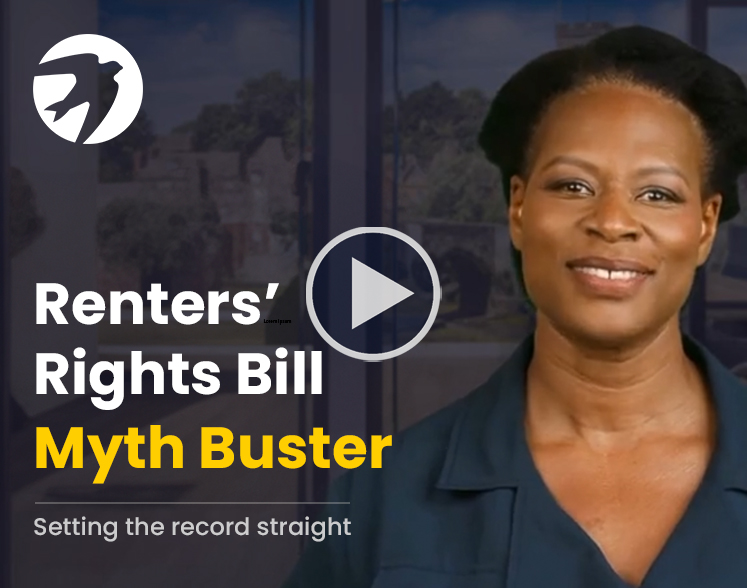5 Myths Debunked
The Renters' Rights Bill Explained for Landlords
The Renters' Rights Bill is a hot topic, and understandably so. As a landlord, you might worry about how the proposed changes might affect you and your buy-to-let investments. Here at The Robinson Jackson Group, we understand your concerns. There is a lot of misinformation circulating, so we've put together this guide – and a video you can watch here – to address the five most common myths and set the record straight.
Let's dive in!
Myth #1: Landlords will no longer be able to evict tenants.
This is simply not true. The focus of the Renters' Rights Bill is to prevent unjustified evictions whilst continuing to allow legitimate ones. Landlords will still be able to evict tenants for legitimate reasons, such as:
- Rent arrears: The threshold for eviction is likely to change but non-payment remains a valid reason. Note that previously, two months' arrears could trigger eviction proceedings. Under the new bill, this is likely to increase to three months. Additionally, the required notice period for eviction due to rent arrears will increase from two to four weeks.
- Antisocial behaviour: Severe antisocial or criminal behaviour by tenants will also be valid grounds for eviction.
Myth #2: Landlords won't be able to gain possession for personal reasons.
Were you considering selling your investment property or needing it for a close family member to move into? Don't worry, you'll still be able to evict your tenant under these circumstances. However, there are likely to be a few new rules:
- Minimum Tenancy Length: Landlords will have to offer a tenant a minimum of 12 months' security on a new tenancy agreement.
- Notice Period for Selling or Moving In: If you need to sell or move into the property yourself, you will need to give the tenant at least four months' notice.
The bottom line? Eviction for genuine reasons will still be possible under the new bill.
Myth #3: Landlords will not be able to increase the rent, and there will be a 'rent cap'.
The Renters' Rights Bill isn't designed to prevent landlords from receiving fair property rent. It's aimed at preventing unfair rent increases. Here's what you can expect:
- Annual Rent Increases: You will still be able to increase the rent once a year, in line with the current market value.
- Section 13 Notice Required: The current Section 13 notice process will still be used to increase rent. However, the notice period will change from one month to two months.
Myth #4: Landlord’s properties will be damaged by being forced to accept pets.
Whilst the option to categorically refuse pets will be removed, the bill won’t force you to accept any pet request. Landlords will still be able to refuse for a legitimate reason, such as:
- Freehold Restrictions: If your property's lease or freehold agreement from a superior landlord prohibits pets, this will be a valid reason for refusal.
However, under the new bill, landlords will no longer be able to adopt a blanket "no pets" policy. But here's some good news:
- Pet Damage Protection: Landlords will have the right to require tenants with pets to take out insurance specifically for pet damage.
Myth #5: Landlords will find the new dispute resolution process time-consuming and expensive.
The effect of a new resolution process might create a more efficient and cost-effective system for resolving disputes between landlords and tenants. This is because:
- Mediation: A neutral third party will help both parties reach an agreement without resorting to court.
- Arbitration: A neutral third party will make a binding decision, similar to a court case but typically faster and less expensive.
Additionally, the new bill proposes the introduction of a dedicated ombudsperson service. This will offer landlords:
- Guidance and Support: The ombudsman will provide guidance on handling tenant complaints and navigating the new regulations.
What Happens Next?
While the exact timeframe for the bill's implementation is still in the air, it's expected to receive Royal Assent by Spring 2025 and come into effect by early Autumn 2025. This will apply to all tenancies, new and existing.
Feeling More Informed? Let's Talk!
We hope this explanation and our accompanying video have cleared some confusion surrounding the Renters' Rights Bill. If you have any further questions about the bill or other property management aspects, please contact your local lettings team! Our experienced professionals are here to help. Whether you're an existing client or just starting your buy-to-let journey, we're happy to provide expert advice and ensure your investments are well-managed.
Visit our website to find your nearest Letting Centre in The Robinson Jackson Group.
Please note: The viewpoints in this article are based on the current details regarding the Renters Rights Bill in the public domain. Details may change when the bill becomes law, so landlords are advised to subscribe to The Seasoned Investor, our newsletter written by an investor for investors.
All News ≫






